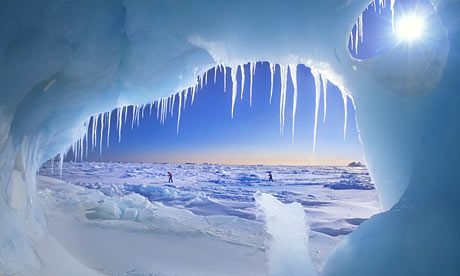Polar ice: Less in the Arctic, more in the Antarctic

Arctic sea ice is at its lowest level in thousands of years, and the once ice-bound Bering Strait between Russia and Alaska is increasingly being used by shippers as a new route. The National Oceanic and Atmospheric Administration (NOAA) is currently charting these new waters and providing information on navigational hazards.
The polar bear is now listed as an endangered species by the Department of the Interior, and the world’s first ice navigation training course is being offered in Norway specifically for the Arctic waters. Some had hoped the Arctic meltdown would increase CO2 absorption rates and thus help remediate climate change because of the greater available water surface.
But, new research published in Science shows that part of the Arctic Ocean has already absorbed nearly all the CO2 it can. That’s not good. The vastly increased amount of shipping will certainly be a boon for ports and commerce in the area, but the question is, why is Arctic ice melting so dramatically in the summer now, a process which has been well-documented by the NOAA Arctic Report Card.
Because, ironically, NOAA also says that Antarctic ice is increasing, something which indicates a cooling trend in that area and a reversal of the climate trend, even as global temperatures have been the warmest on record in 2010. Confusing, isn’t it?
Such apparently conflicting data gives partisans on both sides of the global warming issue ample ammunition to lambast the other side as being clueless dimbulbs who don’t know what’s going on. It’s unfortunate that the debate has been so instantly politicized.
But, clearly, something is happening. The Arctic is becoming ice free. This is new. And the Antarctic is becoming icier. However, there’s a good reason that ‘climate change’ is a better term than ‘global warming’. It implies that the results will vary depending on where you are. Everything doesn’t get warmer. Some areas will get colder.
What could all this mean?
A warming Arctic will clearly have devastating effects on the animal and plant populations, many of which may not survive. Previously remote parts of Alaska will boom economically as ports and support for shipping are built.
Drilling for oil in Alaska and Canada could become more, not less, problematic. If the permafrost melts, then current roads will become seas of mud in the spring making it difficult to get heavy equipment through. Sea routes opened by decreasing ice probably can’t get the equipment close enough to where it’s needed without using land routes.
Multiple countries border the Arctic and will certainly make claim to parts of the new shipping routes. The area will certainly become a new and vital geopolitical area with many competing interests vying for dominance. Russia is planning experimental voyages in September from Murmansk (near the northern tip of Finland) through the Arctic to countries in Southeast Asia. Not only will this route be much cheaper and faster, it also avoids going through the Suez Canal and potentially facing Somali pirates, Russia says.
Ports in California may find it similarly more expedient to ship to Europe via the Arctic rather than through the Panama Canal or around South America. Will traffic in the Panama Canal drop as the Arctic route becomes popular?
Commerce will definitely increase in the Arctic. But clearly, the climate there has changed too.




